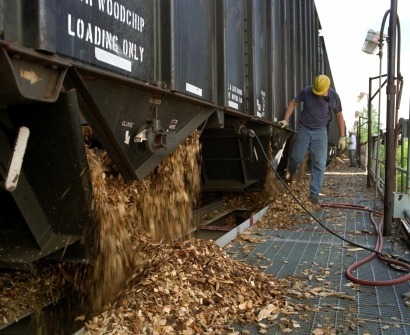
The RFG has issued a response to the consultation document published by the Office of Rail Regulation proposing a freight specific charge for rail-transported biomass. As well as driving biomass off the rail network, the RFG argues, increased charges would also act to undermine the case for biomass generated power in the UK.
The ORR document, entitled ‘Consultation on a freight specific charge for biomass’, proposes to increase charges for rail-transported biomass from April 2014, during the next control period.
“Biomass is an important new market for rail freight and, with coal volumes set to decline, it is vital to the rail operators long-term business” said Maggie Simpson, RFG Executive Director. “It will also protect and create new jobs, and encourage investment. ORR must commit to supporting this sector, by not applying this increased charge, and by ensuring that its policies are aligned with Government energy policy.”
The RFG is concerned that the proposals, if implemented, could lead to a loss of the existing market and prevent future growth with serious implications for both the rail freight sector, given the declining levels of coal freight, and the power generation market. Biomass traffic will increasingly help to offset the expected loss of coal traffic as the UK seeks to decarbonise its energy infrastructure.
The government provides support for biomass generation under the Renewables Obligation (RO) and, in the near future, the Contracts for Difference (CfD) regime. However neither of these include adjustments for higher transportation costs and without such support biomass generation would not be viable, thereby effectively preventing biomass generation from proceeding in contravention of government energy policy. The RFG is concerned that ORR has issued the consultation without seeking clarity on the issue from the Department of Energy and Climate Change (DECC). It is also not clear how the proposals align with the ORR’s statutory duty to contribute towards the achievement of sustainable development.
The RFG also argue that ORR’s assessment of the impact of the proposals on supply chain costs do not take account of the need for investment in the biomass sector, particularly given that the biomass supply chain has not yet been established and ports and inland destinations not confirmed. The volume of traffic and the extent to which biomass will replace coal is therefore not yet understood potentially making any present estimate of freight specific charges for biomass inaccurate. On this basis the RFG have called on the ORR to delay any such charges for at least two control periods while the biomass market and its supply chain are being established. Any proposals thereafter should be aligned with government energy policy and on-going support mechanisms.
RFG discussions with DECC have so far suggested that in order to meet sustainability requirements, major movements of biomass material must be carried out by rail. The group also argues that charges cannot be levied as a result of comparison with existing coal traffic since biomass freight will be invariably be lighter and therefore may benefit from longer trains. The maximum total volumes of biomass are also likely to be considerably lower than that of coal and biomass is unlikely to require the same infrastructure as not all power stations are expected to convert. This means that the supply pattern for the biomass market will be different to that of coal
Further information:
Consultation on a freight specific charge for biomass – Office for Rail Regulation (ORR)

